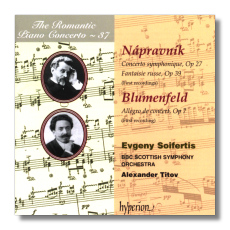
The Internet's Premier Classical Music Source
Related Links
- Latest Reviews
- More Reviews
-
By Composer
-
Collections
DVD & Blu-ray
Books
Concert Reviews
Articles/Interviews
Software
Audio
Search Amazon
Recommended Links
Site News
 CD Review
CD Review
The Romantic Piano Concerto - Volume 37

- Eduard Napravnik:
- Concerto symphonique in A minor, Op. 27 (1877 - 31:15)
- Fantaisie russe in B minor, Op. 39 (1881 - 12:19)
- Felix Blumenfeld: Allegro de concert in A Major, Op. 7 (1889 - 13:54)
Evgeny Soifertis, piano
BBC Scottish Symphony Orchestra/Alexander Titiov
Recorded Caird Hall, Dundee, Scotland, September 2004
Hyperion CDA67511 57:28
The Hyperion Romantic Piano Concerto Series has been a valuable compendium of relatively obscure works for solo piano and orchestra. Most of the volumes have featured compositions that deserve a place in the concert hall, but a few are evidence to the fact that some music is obscure for good reasons. Unfortunately, Volume 37 resides in the latter category.
Both Eduard Napravnik (1839-1916) and Felix Blumenfeld (1863-1931) were fascinating and highly accomplished music professionals. Of Czech origin, Napravnik permanently moved to Russia in 1862 and became the chief conductor of the Mariinsky Theatre in 1869, holding this position well into the 20th century. It was through his leadership of the Mariinsky Theatre that Napravnik greatly influenced and supported Russian music by giving the premières of over eighty Russian operas. He also was quite prolific as a composer, writing four operas, four symphonies, three string quartets, two piano trios, a piano quartet, violin sonata, and a host of solo piano pieces. His legacy as a conductor and champion of Russian music is substantial, but his own music has been largely discarded.
Blumenfeld seemed to have a finger in every piece of the musical pie. He was a highly regarded teacher and pianist, nurturing the likes of Horowitz and Barere. As an editor, he effectively championed the works of other Russian composers. His own compositions number over 60 and include a symphony, string quartet, thirty-four songs, and numerous solo piano pieces.
The best part of the program is the powerful 1st Movement from Napravnik's Concerto symphonique. Marked Allegro energico, the exposition's primary theme is thrilling in its determination and drive while the brass section belts out the music's urgency and the piano plays 'faster than the speed of light' octaves. However, my overall impression of Napravnik's music is that it's "show piece material" all the way in the grand romantic style. One will look in vain for any sense of substance or coherence other than architectural. Ultimately, it's a case of music without a soul. This type of music needs a great melodist at the helm such as Litolff in two earlier Hyperion volumes; Napravnik is not a great melodist. That is his shortcoming and the reason why his compositions are rarely played.
Blumenfeld's Allegro de concert is largely cut from the same cloth as the two Napravnik works except it is less aggressive and more legato-shaped than the Napravnik; also, there is no denying that Blumenfeld has a greater affinity for the piano. The performances and sonics are excellent, and Soifertis is an up and coming pianist whose future will be interesting to chart.
Copyright © 2005/2006, Don Satz




















